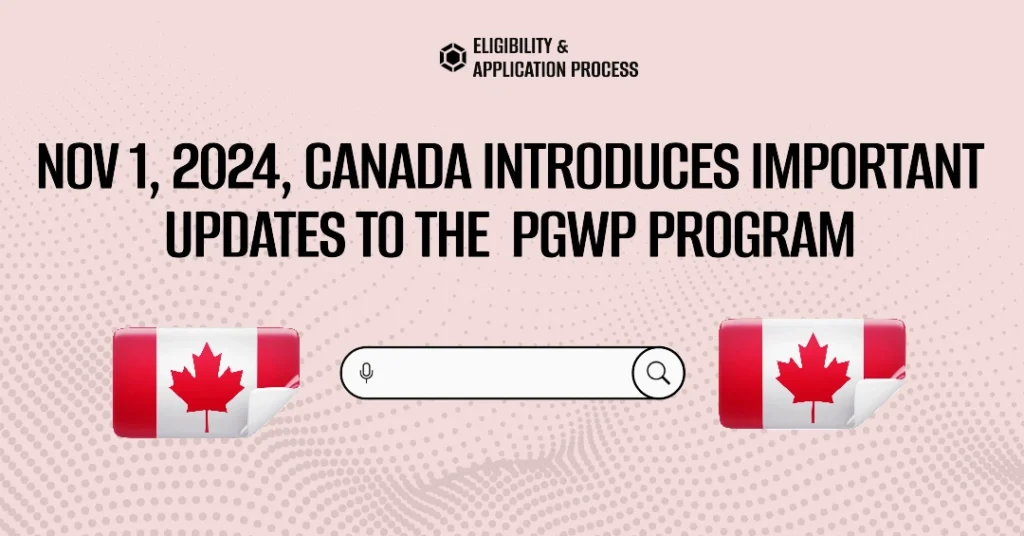Canada is making significant changes to the Post-Graduation Work Permit (PGWP) Program, effective November 1, 2024. These updates aim to better align the skills of international graduates with the country’s long-term labor market needs. In this article, we’ll explore the key changes and their implications for international students aspiring to work in Canada after completing their studies.
Canada PGWP Update: Key Changes to PGWP Eligibility
The upcoming changes to the PGWP eligibility criteria will require international students to meet specific conditions related to their field of study and language proficiency. The Canadian government has identified five key sectors experiencing labor shortages where graduates will have enhanced opportunities for obtaining a PGWP:
- Healthcare
- Agriculture and Agri-Food
- Trade and Transport
- Science, Technology, Engineering, and Mathematics (STEM)
Graduates in these fields will have a higher likelihood of securing a PGWP, reflecting Canada’s focus on addressing critical labor market gaps.
Designated Learning Institutions (DLIs)
To qualify for a PGWP, students must graduate from a Designated Learning Institution (DLI) in Canada. Not every DLI offers programs that are eligible for the PGWP, so it’s crucial to verify that the program you enroll in meets the eligibility criteria. Students should ensure they fulfill all requirements specific to their institution and program, including completing a full-time course lasting at least eight months. Programs centered on the five critical fields will be prioritized in the new system.

Language Requirements: Raising the Bar
One of the most significant updates to the PGWP program involves increased language proficiency requirements. Effective November 2024, all applicants must demonstrate competence in either English or French through recognized tests, including:
- Canadian English Language Proficiency Index Program (CELPIP)
- International English Language Testing System (IELTS General Training)
- Pearson Test of English (PTE Core)
- Test d’évaluation de français (TEF Canada)
- Test de connaissance du français (TCF Canada)
The Canadian Language Benchmarks (CLB) standards will apply to English speakers, while French speakers will follow the Niveaux de compétence linguistique canadiens (NCLC). The minimum score requirements will vary based on the applicant’s level of education:
- University Graduates (Bachelor’s, Master’s, or Doctoral degrees): CLB 7 or NCLC 7 across all four skills (reading, writing, speaking, and listening).
- College Program Graduates: CLB 5 or NCLC 5 in all four skills.
These enhancements aim to ensure that PGWP holders possess the necessary language skills to effectively integrate into the Canadian workforce.
Language Test Validity
Applicants must note that language test results submitted for the PGWP application should be no older than two years at the time of application. It is advisable to take these tests early, ensuring the results are current when applying for the work permit.
Field of Study Requirements: Focusing on In-Demand Occupations
Under the revised PGWP rules, international students must complete a program that aligns with one of the identified fields experiencing labor shortages. The five major categories—healthcare, agriculture, trade and transport, and STEM—are at the forefront of Canada’s economic needs.
For example, graduates in healthcare-related fields, such as nursing or medical technology, will find it easier to secure a work permit due to ongoing shortages in these professions. Similarly, students graduating from agricultural programs that emphasize sustainable practices will also be in high demand.
Graduates from these in-demand programs will be well-positioned to transition from temporary residency to permanent residency through pathways such as the Canadian Experience Class (CEC) or Provincial Nominee Program (PNP).
What Remains the Same: No Changes to General and Physical Location Requirements
Despite the updates, some fundamental aspects of the PGWP program will remain unchanged:
- General Requirements: Applicants must continue to meet the general requirements to apply for the PGWP, including completing a study program at a DLI and applying for the permit within 180 days of receiving their final marks.
- Physical Location: The requirement for physical presence in Canada while completing studies remains in effect. Online courses taken outside Canada will not qualify for the PGWP.
- Flight School Graduates: Students graduating from flight schools eligible for the PGWP are not impacted by these new rules and will continue to qualify under existing guidelines.
Canada Implement New Rules for Post-Graduation Work Permits Eligibility Criteria
Top LMIA-Approved Jobs in Canada October 2024: Leading Companies & Application Process
Canada Boosts Startup Ecosystem with Open Work Permits for Startup Visa Applicants 2024
Express Entry Draws October 2024: IRCC Issues 2,113 PR Invitations in Latest Draws
IRCC Extends Public Policy for Immigration Medical Examination Exemptions until 2029
The Application Process: Key Dates and Deadlines
With the introduction of these new rules, students must be aware of important deadlines:
- Before November 1, 2024: If you apply for a study permit before this date, you must still adhere to the current PGWP eligibility rules. However, from November 1 onward, you will need to meet the new language and field of study requirements when applying for a work permit.
- After November 1, 2024: New applications will be subject to the updated criteria. It’s essential to ensure you meet these requirements by selecting programs and institutions that comply with the new guidelines.
Final Thoughts: Adapting to Canada’s PGWP Changes
The upcoming changes to the PGWP program signify Canada’s commitment to adapting its immigration policies to meet its labor market needs. International students looking to stay in Canada post-graduation should proactively plan to meet the new language and educational requirements, especially in fields experiencing significant labor shortages.
By implementing these changes, Canada aims to cultivate a skilled workforce that aligns with its economic growth and innovation objectives. Students are encouraged to stay informed and adjust their educational paths to maximize their chances of benefiting from Canada’s post-graduation work opportunities.


Leave a Reply